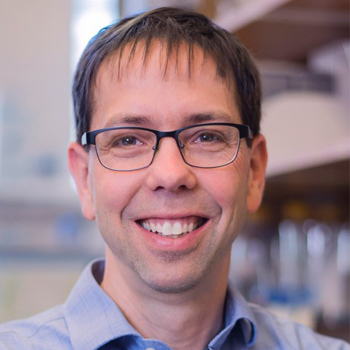Kuhlman solves protein puzzles with a modeling program
The 91—«…´¥´√Ω has given the 2019 DeLano Award for Computational Biosciences to , a professor of biochemistry and biophysics at the University of North Carolina School of Medicine. The award recognizes scientists whose work excels in two key elements: “more productive use of computers to accelerate and facilitate research, and ready access of these programs for the scientific community.”

“What a fantastic honor! Warren DeLano’s software, PyMOL, is a terrific example of what can be achieved by making research tools easily accessible. It has been very rewarding to contribute to the Rosetta software and community in the same way, and it is exciting to see all of the wonderful proteins that are being designed with Rosetta.”
— BRIAN KUHLMAN
Kuhlman’s studies have done exactly that; of the National Cancer Institute wrote in her nomination letter, “I cannot think of a more deserving recipient than Prof. Kuhlman.”
Kuhlman’s work can be described broadly as using computers and computational biology to design new protein structures and functions. As a postdoc in David Baker’s laboratory, Kuhlman created a protein design module in the molecular modeling software Rosetta. As a professor, he has continued to advance the uses of Rosetta in several forms: protein interface design, antibody assembly and engineering photoactivatable proteins. He makes the modules available to all researchers.
In the field of protein interface design, Kuhlman’s lab has redesigned proteins to increase their affinity to binding partners and has designed interfaces that allow previously nonbinding proteins to bind each other or other substrates they would not typically bind. This has achieved binding with micro to nanomolar affinities, and the experimentally determined structures of his designed interfaces typically were quite similar to his models, showing how effective his modeling techniques are. This work and his freely available Rosetta modules open the doors for many researchers to use these ideas in countless other fields.
of the Weizmann Institute of Science wrote in support of the nomination that Kuhlman “is known for driving technology as well as using it in biologically important applications.”
Kuhlman’s group has worked to solve the longstanding problem of creating bispecific antibodies, antibodies that bind two different antigens, by creating a novel protocol for multi-state protein design. They generated two different light and heavy chains with orthogonal interfaces that can be assembled with high fidelity. This has significant potential in any field where two cellular structures need to be brought in close proximity, including cancer immunotherapy.
The lab is also working on creating protein switches that can be turned on or off using light with high spatial and temporal resolution. They are designing these switches to control intracellular localization, gene expression and differentiation.
Kuhlman is known among his colleagues as an innovative and reliable scientist, an effective and wise collaborator, and a superb speaker. This is shown in his high (and increasing) number of citations, his many papers written in collaboration with other labs and the many talks he gives around the world.
Kuhlman will receive his award during the 91—«…´¥´√Ω annual meeting at the Experimental Biology 2019 conference in Orlando, where he will deliver an award lecture titled “Designing novel protein structures and interactions with Rosetta” at 1:45 p.m. April 9 in Valencia Ballroom A at the Orange County Convention Center.
Enjoy reading 91—«…´¥´√Ω Today?
Become a member to receive the print edition four times a year and the digital edition monthly.
Learn moreGet the latest from 91—«…´¥´√Ω Today
Enter your email address, and we’ll send you a weekly email with recent articles, interviews and more.
Latest in People
People highlights or most popular articles

Hidden strengths of an autistic scientist
Navigating the world of scientific research as an autistic scientist comes with unique challenges —microaggressions, communication hurdles and the constant pressure to conform to social norms, postbaccalaureate student Taylor Stolberg writes.

Richard Silverman to speak at 91—«…´¥´√Ω 2025
Richard Silverman and Melissa Moore are the featured speakers at the 91—«…´¥´√Ω annual meeting to be held April 12-15 in Chicago.

Women’s History Month: Educating and inspiring generations
Through early classroom experiences, undergraduate education and advanced research training, women leaders are shaping a more inclusive and supportive scientific community.

91—«…´¥´√Ω honors Lawrence Tabak with public service award
He will deliver prerecorded remarks at the 2025 91—«…´¥´√Ω Annual Meeting in Chicago.

91—«…´¥´√Ω names 2025 JBC/Tabor Award winners
The six awardees are first authors of outstanding papers published in 2024 in the Journal of Biological Chemistry.

Daniel N. Hebert (1962–2024)
Daniel Hebert’s colleagues remember the passionate glycobiologistscientist, caring mentor and kind friend.

